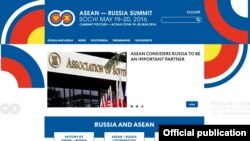Russia is set to finalize an agreement with Asean countries including controversial references to maritime navigation and militarization of the South China Sea, a draft of the accord obtained by VOA Khmer shows.
According to a draft of the Sochi Declaration, which is dated May 7 and marked as the agreed text, Russia is moving towards a “strategic partnership for mutual benefit” covering security, trade, social, health and environmental issues.
The unprecedented engagement with the 10-member Association of Southeast Asian Nations, is part of the Putin administration’s efforts to expand their influence in the region. It comes as U.S. President Barak Obama is due to visit Vietnam to strengthen ties with Hanoi a week after the U.S. sent a warship to the disputed sea.
The agreement, due to be adopted on Friday, states that Asean and Russia agreed to “Ensure maritime security and safety, freedom of navigation and overflight, unimpeded commerce. Promote self-restraint, non-use of force or the threat of force and the resolution of dispute through peaceful means in accordance with universally recognized principles of international law.”
The parties also agreed to “Support the full and effective implementation of the Declaration on the Conduct of Parties in the South China Sea (DOC) and early conclusion of an effective Code of Conduct in South China Sea (COC) on the basis of consensus.”
The move comes after the U.S. Department of Defense last week sent a warship to the sea to carry out freedom of navigation operations.
The USS William P. Lawrence sailed within 12 nautical miles of the China-occupied Fiery Cross Reef to "challenge excessive maritime claims of some claimants in the South China Sea," said Bill Urban, a department of defense spokesman.
"These excessive maritime claims are inconsistent with international law as reflected in the Law of the Sea Convention in that they purport to restrict the navigation rights that the United States and all states are entitled to exercise," he said in an email.
China responded with anger Tuesday morning, with foreign ministry spokesman Lu Kang telling a daily news briefing that the ship entered Chinese waters illegally and that the move threatened peace and stability in the region.
Several Asean states have overlapping claims to the sea, notably China, Vietnam and the Philippines. Many in the regional group have advocated a multi-party solution to the problem, but Beijing has said it will only engage in bilateral talks over territorial disputes.
Cambodia, a close ally of China in the region, has previously rejected calls for the disputes to be resolved through Asean, echoing China’s call for bilateral talks.
Cambodia and neighboring Laos, which have received large amounts of financial aid from China in recent years, could find themselves in a tricky position if asked to commit to the principles in the Sochi Declaration. However some observers expressed doubt that the accord would carry much weight.
John Ciorciari, a professor of public policy at the University of Michigan who specializes in Southeast Asia, said Putin’s Russia was “looking for ways to regain some of its past global presence and stature.”
“Russian defense firms are also looking for export markets. Russia is thus an eligible partner for Asean states trying to diversify their great-power ties in a period of waxing Chinese influence,” he said.
“Ties to major powers like India and Russia help Asean states boost their capabilities, enmeshes more players in the multilateral regional framework, and helps Asean members avoid having to pick sides in the midst of rising Sino-US competition.”
The draft declaration also includes agreements on deepening political, security, anti-terrorism and economic cooperation “based on principles of equality, mutual benefit and shared responsibility to promote peace, stability, security, prosperity, economic grow, sustainable development and social progress in Asia-Pacific region with a view to working towards a strategic partnership.”
According to the text, Russia also proposed a “comprehensive” free trade agreement between Asean and the Eurasian Economic Union, a single market with a gross domestic product of about $4 trillion. Asean countries said they would consider the proposal.
Chheang Vannnarith, head of the Cambodian Institute for Strategic Studies, said that while the Sochi Declaration is a sign of growing Russian cooperation in the region, it did not necessarily mean that Russia would become a strategic partner with Asean.
“Russia in recent years has focused on Asia as Russia faces diplomatic and economic pressures from the U.S. and E.U. So Asia is a key gateway for Russia to continue its economic development and to continue its diplomatic campaign in the Asia-Pacific region,” he said, adding that several Asean nations wanted Russia to remain neutral over the South China Sea.
“Russia should strengthen its stance to be neutral in the South China Sea and should not take sides,” he said.
Prime Minister Hun Sen, who is visiting Russia for the Sochi summit, wrote on his official Facebook page earlier this week that Cambodia hoped to strengthen ties with Russia, “especially the efforts for trade relations, tourism, investment, and the culture of both countries to be stronger and healthier.”
Hun Sen is scheduled to meet with his counterpart, Russian Prime Minister Dmitry Mededev and Putin to sign 10 memoranda of understanding.
Ou Virak, founder of the Future Forum think tank, said he was concerned by Cambodia’s increasingly close relationship with both Russia and China.
“In this case I see that we can’t avoid a new Cold War and if so Asean is the hottest zone and Cambodia as a small country would become a pawn if Cambodia is not cautious,” he said.









